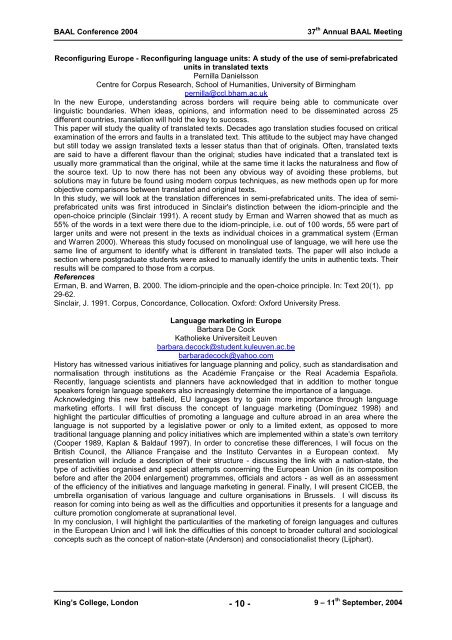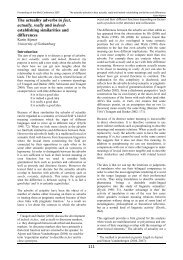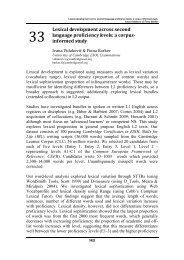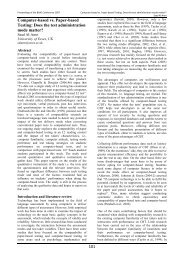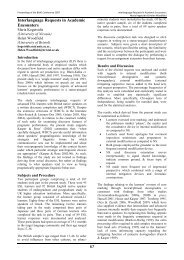Colloquia - British Association for Applied Linguistics
Colloquia - British Association for Applied Linguistics
Colloquia - British Association for Applied Linguistics
Create successful ePaper yourself
Turn your PDF publications into a flip-book with our unique Google optimized e-Paper software.
BAAL Conference 2004 37 th Annual BAAL Meeting<br />
Reconfiguring Europe - Reconfiguring language units: A study of the use of semi-prefabricated<br />
units in translated texts<br />
Pernilla Danielsson<br />
Centre <strong>for</strong> Corpus Research, School of Humanities, University of Birmingham<br />
pernilla@ccl.bham.ac.uk<br />
In the new Europe, understanding across borders will require being able to communicate over<br />
linguistic boundaries. When ideas, opinions, and in<strong>for</strong>mation need to be disseminated across 25<br />
different countries, translation will hold the key to success.<br />
This paper will study the quality of translated texts. Decades ago translation studies focused on critical<br />
examination of the errors and faults in a translated text. This attitude to the subject may have changed<br />
but still today we assign translated texts a lesser status than that of originals. Often, translated texts<br />
are said to have a different flavour than the original; studies have indicated that a translated text is<br />
usually more grammatical than the original, while at the same time it lacks the naturalness and flow of<br />
the source text. Up to now there has not been any obvious way of avoiding these problems, but<br />
solutions may in future be found using modern corpus techniques, as new methods open up <strong>for</strong> more<br />
objective comparisons between translated and original texts.<br />
In this study, we will look at the translation differences in semi-prefabricated units. The idea of semiprefabricated<br />
units was first introduced in Sinclair's distinction between the idiom-principle and the<br />
open-choice principle (Sinclair 1991). A recent study by Erman and Warren showed that as much as<br />
55% of the words in a text were there due to the idiom-principle, i.e. out of 100 words, 55 were part of<br />
larger units and were not present in the texts as individual choices in a grammatical system (Erman<br />
and Warren 2000). Whereas this study focused on monolingual use of language, we will here use the<br />
same line of argument to identify what is different in translated texts. The paper will also include a<br />
section where postgraduate students were asked to manually identify the units in authentic texts. Their<br />
results will be compared to those from a corpus.<br />
References<br />
Erman, B. and Warren, B. 2000. The idiom-principle and the open-choice principle. In: Text 20(1), pp<br />
29-62.<br />
Sinclair, J. 1991. Corpus, Concordance, Collocation. Ox<strong>for</strong>d: Ox<strong>for</strong>d University Press.<br />
Language marketing in Europe<br />
Barbara De Cock<br />
Katholieke Universiteit Leuven<br />
barbara.decock@student.kuleuven.ac.be<br />
barbaradecock@yahoo.com<br />
History has witnessed various initiatives <strong>for</strong> language planning and policy, such as standardisation and<br />
normalisation through institutions as the Académie Française or the Real Academia Española.<br />
Recently, language scientists and planners have acknowledged that in addition to mother tongue<br />
speakers <strong>for</strong>eign language speakers also increasingly determine the importance of a language.<br />
Acknowledging this new battlefield, EU languages try to gain more importance through language<br />
marketing ef<strong>for</strong>ts. I will first discuss the concept of language marketing (Domínguez 1998) and<br />
highlight the particular difficulties of promoting a language and culture abroad in an area where the<br />
language is not supported by a legislative power or only to a limited extent, as opposed to more<br />
traditional language planning and policy initiatives which are implemented within a state‟s own territory<br />
(Cooper 1989, Kaplan & Baldauf 1997). In order to concretise these differences, I will focus on the<br />
<strong>British</strong> Council, the Alliance Française and the Instituto Cervantes in a European context. My<br />
presentation will include a description of their structure - discussing the link with a nation-state, the<br />
type of activities organised and special attempts concerning the European Union (in its composition<br />
be<strong>for</strong>e and after the 2004 enlargement) programmes, officials and actors - as well as an assessment<br />
of the efficiency of the initiatives and language marketing in general. Finally, I will present CICEB, the<br />
umbrella organisation of various language and culture organisations in Brussels. I will discuss its<br />
reason <strong>for</strong> coming into being as well as the difficulties and opportunities it presents <strong>for</strong> a language and<br />
culture promotion conglomerate at supranational level.<br />
In my conclusion, I will highlight the particularities of the marketing of <strong>for</strong>eign languages and cultures<br />
in the European Union and I will link the difficulties of this concept to broader cultural and sociological<br />
concepts such as the concept of nation-state (Anderson) and consociationalist theory (Lijphart).<br />
King‟s College, London 9 – 11 th - 10 -<br />
September, 2004


